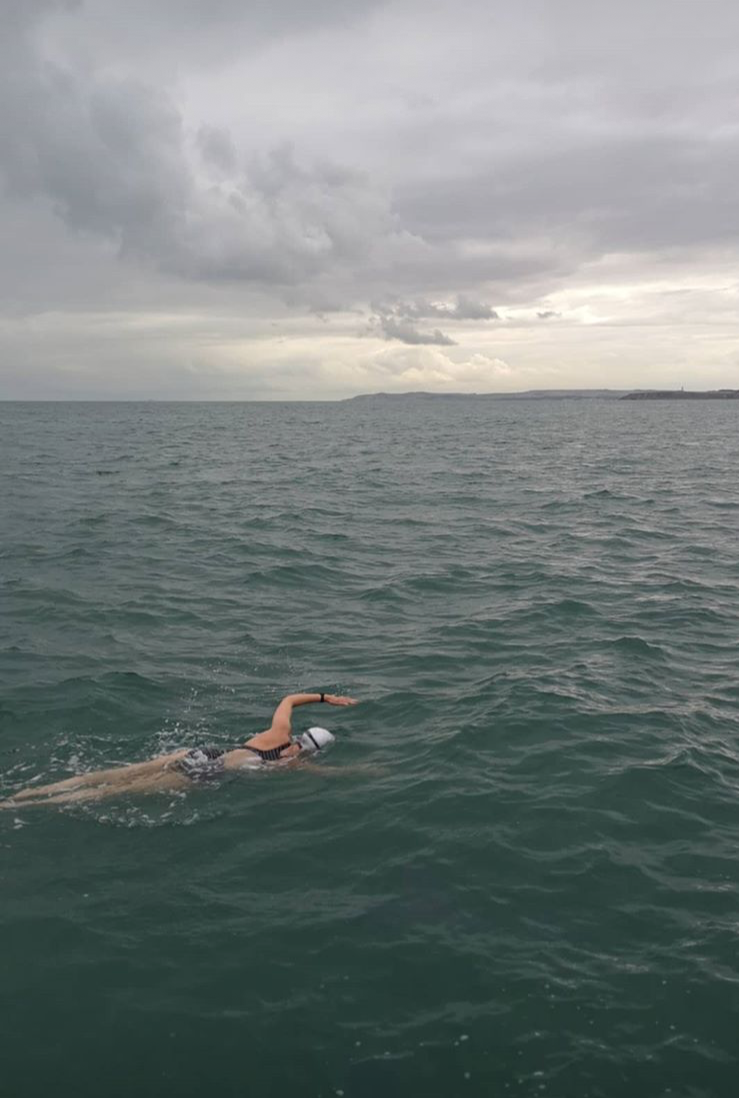Maddy Duxbury was more surprised than anyone by her positive reaction to a failed attempt to swim across the Channel. Here, she reflects on how learning to ‘fail successfully’ has been the greatest success of all.
Against the backdrop of a moonlit sky, I plunged into the dark English Channel waters and struggled for breath as the cold enveloped my body and I envisioned sharks coming at me from every angle…nightlife had really changed since Coronavirus came along.
When in November 2019, I’d attended the Aspire Assessment Day to try and secure a place on one of the relay teams organised to swim the Channel each summer, I hadn’t really thought too much about the reality of it. I was so excited by the thought of fulfilling a childhood dream and the idea of regaling my swimming journey to people that I’d skimmed over the finer details of what this mission would really entail.
And good job too, because if I’d properly considered the physical challenges (of swimming in ice-cold water) on top of the mental battles (fighting back fears of marine life swimming beside me in murky water) I probably would not have even bothered.
You may also like
"You must always risk failure. Failure doesn’t matter, not trying matters": Nigella shares her life lessons at Stylist Live
However, writing this in the aftermath of our attempted crossing, it seems like the “failure” of the trip or rather my reaction to it, may just have been the best thing to have come out of tthis challenge.
Having set sail from Dover Marina at 10pm on 31st August, our team swam throughout the night and got 1.5 miles off the French coastline before being forced to turn back due to bad weather. We remain the only Aspire team this year to have not completed the crossing, and whilst failure is a strong word for an activity that was ultimately impacted by weather, I am sure that had this happened a few years ago, I would feel very differently about it. I’m confident that years ago, I would have been beating myself up – recalling other times in life when I hadn’t succeeded, which generally made me feel like crap.
But today, I’m genuinely feeling incredibly proud of what we (and I) had achieved. I’ve shunned the Instagram #HumbleBrag and I’m not holding back on telling anyone and everyone what an amazing thing we did!

But I can’t help but wonder why I feel this way now? Have I become wiser with age? Has the pandemic shifted my priorities? Regardless, if I have in fact mastered the elusive art of “failing successfully,” then surely it needs to be shared in hopes that it may help someone else feel better about what they think are their own failures.
The “omission of an expected or required action” (aka failure) has become a hot topic in recent years. In fact, the new phrase de rigueur “failing successfully” probably highlights why. We’ve held success up to such a high regard for so long, it seems that even failing has to be done well now.
Fear of failure is not a new thing. Worrying about what people will think of us and not wanting to expose our vulnerabilities are age-old issues. But the society we live in today has compounded these and it’s having a severe impact on our mental health. In fact, a recent study by the Good Childhood Report found that children in the UK have the lowest levels of life satisfaction across Europe with “a particularly British fear of failure” partly to blame.
You may also like
Academy Awards 2019: Lady Gaga just taught us a valuable lesson about failure
So what is it about today’s world that has intensified our fear of failure?
Social media (the go-to choice of blame for most societal ills) no doubt plays a part. With its constant churn of picture-perfect moments reminding us of all the things we haven’t achieved and all the people who are seemingly doing everything better than us, the fear of falling short can stop us from even trying.
Then there’s the internet as a whole which keeps tabs on everyone’s past. Reminders of that cringe-worthy blog you wrote, an unflattering photo or embarrassing video, the job you were fired from – all now remain online for everyone to see. Meaning that the previously comforting adage of “today’s news is tomorrow’s chip paper” is actually, old news. Is it any wonder that people are scared to fail when the results might be recorded for years to come?
There’s also the argument that in an increasingly secular world, where the vast majority believe our time on earth is the one-shot we have to get things right, the stakes are incredibly high. Whilst there’s potentially a lot to win by succeeding in this life (“it’s the only one I’ve got so I’m going to do it well”), there’s also a lot to lose (“what a total waste of my life if I’ve failed at everything”).

But attitudes to failure are changing. Against the backdrop of the gig economy and the rise of the entrepreneurial mindset, more recent years have seen us start to examine the more positive sides of failure.
Yep, failure is having a moment and I’m here for it. From Fuck Up Nights where people gather together to celebrate the epic mess ups business owners have made), to critically acclaimed podcasts like “How to Fail” for which Elizabeth Day interviews well known stars about their low moments, failure is the new badge of honour people are (starting to be) proud to wear.
Perhaps that’s why I’ve taken my swim failure so well? I’ve always embraced a trending topic with gusto!
But on reflection, there are several other things I did (some consciously, some sub-consciously) that I think played a part in my positive reaction to the swim not working out as planned.
So, for those of you considering taking up a sporting challenge (or indeed any challenge) but are being held back by the thought of messing up, here’s a few things that helped me to fail successfully (i.e. fail the task, but not let it negatively affect me).
Note, these are NOT tips on how to succeed. They are suggestions for those whose fear of failure has got so strong that its stopping them from doing things.
Define your own success by what motivates you
When taking on a new challenge, consider what your motivation is. If your focus is purely on getting the task done, then be aware that if you don’t get there, the likelihood of you viewing the project as a negative failure could be higher.But if you have a range of motivations, chances are you’ll achieve one of them – and therefore, will experience a more positive failure.
In my case, my key motivator was to have a great story I could regale people with for years to come (yep, my narcissism is probably something I should work on next). The fact that we got 1.5 miles off the coast of France before having to turn back due to weather conditions, arguably makes for a better story than if we’d completed (and certainly the ‘failure’ of the crossing doesn’t take away the multitude of stories I got from the experience).
Other motivations you could consider are meeting new people, getting stronger, seeing new places – the list goes on, but the important thing is not to pin final success purely on the basis of completion of the task.
You may also like
Alexandria Ocasio-Cortez has an important message about feeling like a failure
Enjoy the journey towards your goal
The internal sense of satisfaction knowing you’ve put in the effort to get something done, is a powerful one. Whilst it’s easier to see (and reward) external success, knowing that you’ve dedicated time and energy to get something done, is a great confidence booster.
However, and this is a controversial one, sacrificing a disproportionate amount in order to achieve a goal can potentially lead to a negative failure. Don’t get me wrong, I definitely put in effort when training for the swim.I got up for early morning swims, took long journeys to the beach, financially invested in the necessary swim kit items, took cold showers to try and acclimatise – not to mention the time I put in to actually do the swimming.
But, I didn’t go over the top. I didn’t cancel on social plans, I didn’t go on any crazy diets or quit drinking and I didn’t spend every spare moment in the pool. Whilst I was of course disappointed not to fully make it across, I didn’t have the added frustration of thinking of things I’d missed out on in the lead up. I was able to look back on other things I’d done during that time and was content that my life hadn’t been put on hold entirely for this one activity.
Find what makes you fearful and tackle it head on
A challenge wouldn’t be a challenge if there wasn’t an element of fear involved. When I signed up to this swim, I always knew there was a strong likelihood that we’d be swimming in the dark. But I naively assumed that swimming as part of a team meant that one of the stronger swimmers could take on the night-time leg.
Having had our swim slot cancelled several times, we finally got confirmation that we’d be meeting in Dover Marina at 10pm. That meant I had 24 hours to get my head around the fact that I’d definitely be swimming in the dark. After a brief tearful moment to myself, I got my “big girl” pants on and channelled my nerves into excitement – enough to be able to get into the water for my 3am swim.
This will remain on my list of things I’m proud of for years to come. If you can face a fear when taking on a challenge, you’ll feel like a hero regardless of the end result.

Accept that which you cannot control
Sometimes, things happen that are out of your control – which could mean that you can’t achieve what you set out to do. Case in point, the inclement weather that prevented us from finishing the race. As much as it seems an obvious thing to say – don’t beat yourself up about this. Accepting something doesn’t mean liking, wanting or choosing that outcome but by struggling against the pain – by resisting and rejecting failure – we create undue suffering. Whilst our team was ultimately stopped due to weather conditions, I could have easily found a way to blame myself (“if I’d have swum faster, we would have landed before the weather turned” etc) but I quickly reminded myself that Mother Nature had other plans and accepted them instead of creating an unproductive inner dialogue trying to attribute blame.
In the end, be grateful you could even try
I don’t want to sound too Polly Anna on this one, but be grateful for the opportunity to be able to try. Whether it’s because you’re fit and healthy enough to give something a go, because you’ve got enough money in the bank to be able to afford it or because you’ve got a network of supportive people around you to encourage you to try it in the first place – being grateful for the experience will take the edge off any disappointment in not completing it.
The swim gave me multiple opportunities to feel gratitude. Raising money for a Spinal Health charity gave me a different perspective on my physical abilities. Having friends and colleagues make donations made me thankful for the relationships I’d built over the years, and returning home to a family who brought out the champagne and celebrated like it was a victory made me appreciate the people who have my back no matter what.
You may also like
Alyson Hannigan’s terrible Buffy audition reminds us a “failed” interview isn’t always a disaster
So to conclude, if a fear of failing is holding you back, keep the above in mind. Ensure your motivation is multi-faceted and not solely based on the completion of the task. Put in the effort but don’t make extreme sacrifices. Choose a challenge that involves you having to face a fear – because even if you don’t make the end goal, you’ll still feel like a hero. Practice acceptance: if you don’t achieve the end result, take a moment to feel the disappointment and make space for it – and then make peace with it.Be grateful for the opportunity to be able to try something new and for all the experiences it brings.
Caveat: I don’t want to appear too happy clappy about failure. Obviously, we don’t want to live in a world where everyone’s messing up all the time and not taking responsibility for it (Trump, I’m looking at you)…but for the more “balanced” people out there (i.e. the ones like me who are prone to a little self-destruction when a task hasn’t worked out how they’d planned), I hope these lessons encourage you to give it a go – because failing successfully might just be the greatest success of all.
Follow @StrongWomenUK on Instagram for the latest workouts, delicious recipes and motivation from your favourite fitness experts.
IMAGES: Maddy Duxbury
Source: Read Full Article
